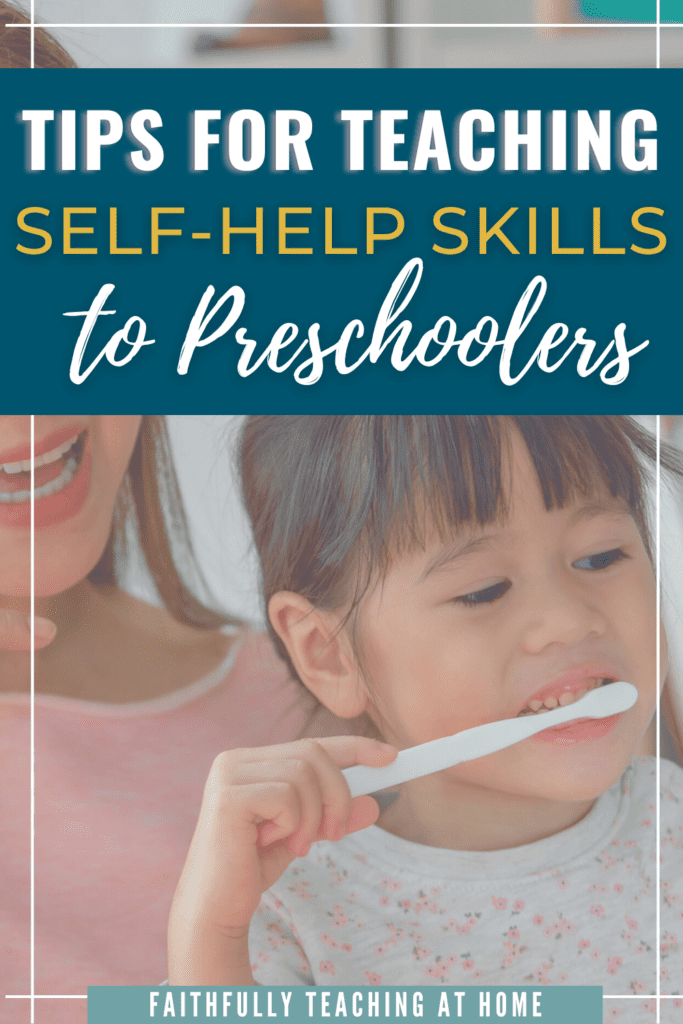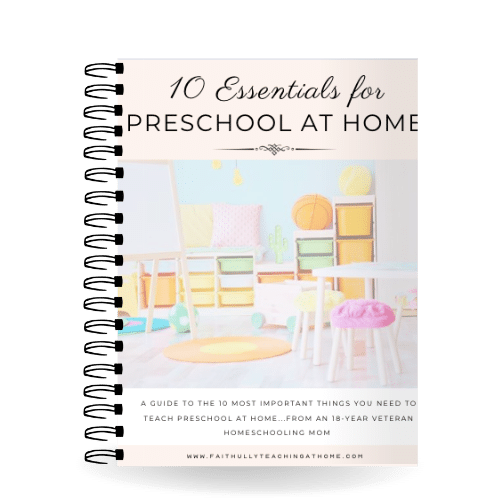
Self-Help Skills for Preschoolers
It usually starts in toddlerhood….the quest for independence. By the time they hit the preschool years, they have pretty much mastered communication skills which caused a lot of frustration for them as toddlers. Now, as preschoolers, they are ready for the next big thing…self-help skills for preschoolers.
What are self-help skills?
Self-help skills can be defined as the tasks or knowledge needed to become independent. So self-help skills for preschoolers are those tasks that they can do themselves which leads them to be more independent.
When talking about self-help skills for preschoolers, we are usually talking about physical self-care skills, like brushing hair and teeth, washing hands, and zipping up a jacket. But sometimes emotional or behavioral skills will be included such as calming down after getting upset or dealing with frustration in a positive way.
Self-Help Milestones
Here is a small sampling of the types of self-help milestones that children reach. I’ve focused on the later toddler and preschool years. But you can look up any age, from infants to teens to find out what milestones they reach.
2-3 years
- Self-feed simple meals with utensils
- Can take socks and shoes off
- Attempts to brush teeth
- May use toilet with help
- Uses napkin to wipe face and hands
3-4 years
- Brushes teeth independently
- Feeds self with no difficulty
- Potty trained
- Dresses and undresses self
- Can unbutton large buttons
- Can take turns
4-5 years
- Can set own place setting at table
- Can learn phone number and address
- Puts shoes and socks on
- Wipes own nose
- Pedal a tricycle
- Pulls up a zipper after it is fastened
Why are self-help skills important?
Think about when your preschooler master the skill of zipping up his jacket for the first time. Wasn’t he proud of himself? My youngest daughter is 6 and still informs me when she zips up her jacket all by herself. Preschoolers are proud of their accomplishments and know these skills are a big deal. As they master tasks one by one, it build self-esteem and confidence and trust in their own abilities. And, of course, it fosters independence which our little ones crave.
And hey, it helps you out, too! Think of the time it saves you by not having to put on their socks and shoes and jackets when you are about to walk out the door. Or how about not having to help them wash their hands before they eat?
If your preschooler will be going to school in kindergarten, their future kindergarten teacher will very much appreciate your child being able to put on her own jacket and zipping it up, washing her own hands, and taking turns without a fight!

10 Self-Help Skills Needed for Kindergarten
Whether learning at home or at a school, preschoolers need to be working on mastering these 10 self-help skills.
- Toilet Training – While most children will be potty trained by kindergarten age, focus on teaching them to wipe their bottoms after a bowel movement. While you are teaching them that, make sure they can and do flush the toilet, too!
- Putting on Shoes and Socks – Life is just easier when your child learns to do this. Now, if they would just learn to keep up with those shoes……! But seriously, children aren’t usually physically ready to learn to tie shoes until between 5 and 6, sometimes later. So shoes with Velcro or slip-on shoes would be best until they learn how to tie. This would let them feel that independence of doing it themselves. Side note…my pediatrician told me that kids are learning to tie shoes later and later in age due to velcro shoes. He wasn’t worried about it, so it didn’t cause me any anxiety to wait a little longer to teach mine to tie shoelaces.
- Meal Time – Preschoolers need to be able to use utensils easily, using a napkin, and open up ziplock baggies, water bottles, and juice boxes. You could even teach them what a child-size portion looks like and how to spoon a portion onto their plate. Putting trash into garbage can, putting containers back into their lunchboxes, and putting dirty dishes in sink are skills also needed.
- Information – Work on your preschooler knowing his first and last name, age, address, and phone number.
- Right and Left – Teach them to know their right and left hands. This is a skill often overlooked by parents.
- Listening and Obeying – I wrote about good listening skills in this post. Obeying goes right along with listening. If your child has a hard time with obeying, be sure to work on that before kindergarten. Kindergarten teachers or us as homeschooling parents don’t have the time or energy to cajole, threaten, or beg a child to obey. Whatever way you choose to teach obedience, be sure to be consistent.
- Cleaning Up – Get your preschooler in the habit of cleaning up after himself whether it be his toys, his dishes, or his dirty clothes. Modeling this yourself is key to getting your children to pick up after themselves. Putting it on their chore chart is another way to remind them every day without having to nag.
- Self-Regulation – The easiest definition of self-regulation is control of oneself. We need to teach our preschoolers how to control their frustration without tantrums, calm themselves down when upset, and handle their emotions when change occurs. This can be hard even for us as adults. So it takes time and commitment.
- Hygiene – This includes brushing hair, brushing teeth, and washing hands. Using a tissue when sick is also beneficial.
- Getting Dressed and Undressed – Preschoolers need to be able to dress themselves, zip up jackets, and button shirts and pants. They may just be able to do larger buttons in kindergarten, but that’s fine.

Tips for teaching self-help skills to preschoolers
- Modeling – Make sure your preschooler sees you modeling how to correctly do the self-help skills that you are trying to teach her. For instance, it’s difficult for us as parents to talk about how important it is to clean up after playing if our children see us not pick up after ourselves.
- Be supportive but don’t do it for them – We are usually the problem when it comes to our kids not learning self-help skills! As parents, we want to do it for them to save time. It’s so much faster to button up their shirt or put on their shoes instead of waiting patiently while they slo-o-o-o-owly do it. So be there for them to ask questions and lend a hand, but don’t step in and do it for them.
- Believe in them – Kids want to be independent, but it’s scary for them. And most of the time, they fail when they first try new tasks. When they say they can’t do it, tell them they can. Make sure they know that you believe in them and their abilities.
- Praise – Praise them when they are successful! When they see how proud you are of them, they will want to keep doing it. Hey, it’s easier for them, too, to let you just do it all for them. So why would they want to laboriously do it themselves? They want that sense of pride and accomplishment…and to hear their mom or dad tell them “Great job!”. If they try and don’t succeed, tell them you are proud of the effort they put into it and that you know they will be able to do it soon with practice.
- Make it easier for them – Give them tools to help them succeed. Want them to wash their hands by themselves? Get them a small stool so they can reach the sink. Do you long for the day they can put on their own shoes? Buy slip-on shoes! Helping them be successful will make your life a little easier too.
- Reward Charts – Sometimes it just takes a little bit of a nudge to get kids to become independent. Reward charts work wonders for this! Just a simple printable chart with stickers or a chart with the promise of a prize at the end….you will be surprised at how much motivation that gives them to be successful!
Want to know what I recommend to teach preschool at home?
Are you thinking of teaching your preschooler at home soon? Not sure what he or she will need to keep up with peers in private preschools? With my background in Early Childhood Education (preK through 3rd), I’ve taught in preschools and even taught preschool to my own 4 children, successfully preparing them for kindergarten while following developmentally appropriate practices. So sign up below to get this FREE 16-page guide to the top 10 essentials that I recommend you need to start teaching preschool while saving hundreds of dollars!






